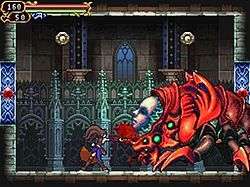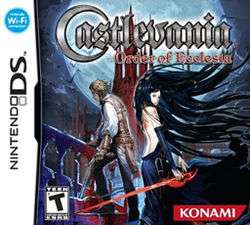Castlevania: Order of Ecclesia
| Castlevania: Order of Ecclesia | |
|---|---|
|
North American box art | |
| Developer(s) | Konami |
| Publisher(s) | Konami |
| Director(s) | Akihiro Minakata |
| Producer(s) | Koji Igarashi |
| Artist(s) | Masaki Hirooka[1] |
| Writer(s) |
Kei Shigema Tomohiro Takeda Katuyuki Kuriyama Takayoshi Kakehashi |
| Composer(s) |
Michiru Yamane Yasuhiro Ichihashi |
| Series | Castlevania |
| Platform(s) | Nintendo DS |
| Release date(s) |
‹See Tfd› ‹See Tfd› |
| Genre(s) | Platform-adventure |
| Mode(s) | Single-player, multiplayer |
Castlevania: Order of Ecclesia, known in Japan as Akumajō Dracula: Ubawareta Kokuin (悪魔城ドラキュラ 奪われた刻印, lit. Devil's Castle Dracula: The Stolen Seal),[5] is a platform-adventure game and the third Nintendo DS installment of the Castlevania franchise. Directed by Akihiro Minakata, with long time producer Koji Igarashi returning. The plot involves Shanoa, who is part of an organization set to defeat Dracula after the Belmont clan has vanished.
Gameplay

Castlevania: Order of Ecclesia is a two dimensional action-adventure game, featuring adventure and role-playing video game elements such as the ability to equip armor and cast spells. A new combat system called the "Glyph System" allows the player's character, Shanoa, to collect icons called "Glyph symbols", which she can acquire by defeating enemies or conquering challenges. These symbols can be equipped to her arms and back, allowing her to perform special powers and skills. There are over 100 different Glyphs the player can wield, such as weapon and magic glyphs. Glyphs use MP (Magic Points) to work, and once the MP gauge is depleted, the player must stop attacking to allow it to recharge. The player can also use a special Glyph Union technique, which calls a more powerful attack based on the glyphs equipped. The Union attacks consume the Heart Points gauge, a feature that was absent in Portrait of Ruin. There are also certain Glyphs which can be used to solve some puzzles.[6]
Many different types of locales can be visited in the game, including forests, mountains, and oceans. There are a total of 20 locations, with an overworld map used to traverse between them. Besides fighting enemies and moving on from one location to next, there are also a number of side quests for the player to solve. After completing a quest, the player will receive a prize in return. If the player finishes the game, new features will become available to the player, including sound test, hard mode, boss rush mode and Albus mode, with an alternate playable character. It also features online play, allowing the player to trade items with other players or go head-to-head in a versus mode.[6] The game also makes use of the DS-to-Wii connectivity with Castlevania Judgment, which unlocks content in both games.[7] Order of Ecclesia is the first canonical game in the series in which the Vampire Killer whip does not appear in any form.
Plot
Castlevania: Order of Ecclesia takes place after Castlevania: Symphony of the Night, sometime in the 1800s, right after the era of Richter Belmont. As the Belmont Clan had vanished by that time, several organizations are created in order to research countermeasures against Dracula and his eventual return. Among these organizations, the most promising was the Order of Ecclesia, who created a triad of magical glyphs based on Dracula's power, named "Dominus." Shanoa is a member chosen by the order's leader, Barlowe, as the human vessel for Dominus. As the ritual begins, the Dominus glyphs (Anger, Hatred, Agony) are stolen by Shanoa's colleague Albus, and Shanoa loses her memories and emotions. She goes to retrieve them, unaware of his true intentions.
In her pursuit, Shanoa arrives in the deserted Wygol Village and finds out that Albus kidnapped its inhabitants, brought them to different hidden locations, and imprisoned them. As Shanoa rescues them throughout the game, she learns that Albus captured them to perform some kind of experiment on them which involved taking samples of their blood. On two occasions, Shanoa tracks down Albus, who willingly gives her two of the Dominus glyphs. When she finds him to be possessed by the power of the third glyph, she is forced to fight him. After killing Albus, his mind and soul are absorbed by Shanoa together with the last Dominus glyph. Albus explains that his true intentions were to find a way to defeat Dracula without Shanoa using Dominus, as he knew that it would kill her if she used it. Her lost memories and emotions were actually taken by Dominus, and not Albus, as Barlowe had told Shanoa. He also reveals that the reason he experimented on the villagers was because they were the last descendants of the Belmont Clan, and he believed their blood would have the power to help him control Dominus without it consuming him.
Confronting Barlowe after learning the truth, Shanoa learns that his true objective is to bring Dracula back to life, using Shanoa as a sacrifice. After Barlowe is defeated in a fight, he offers his own life to revive Dracula, and Dracula's castle appears. Eventually confronting Dracula, Shanoa successfully defeats him using Dominus, seemingly at the cost of her own life. However, Albus appears and reveals that only a single soul has to be offered. He sacrifices his own soul in Shanoa's place, but not before he restores her memories and emotions and asks her to smile for him. The castle crumbles, and Shanoa escapes.
Development
The game was made by the team who developed Castlevania: Portrait of Ruin[8] along with Igarashi.[9] In a Wired interview, Igarashi said, "We're doing another Nintendo DS version. There hasn't been an official announcement, but we're doing it... we want people to enjoy the PSP version Castlevania: The Dracula X Chronicles, and afterwards we're announcing it. So, please wait a little bit".[9] On January 25, 2008 a group of "leaked" screenshots from a DS Castlevania game that also showed Wii connectivity appeared. In response, Igarashi didn't give a direct answer if this was even the same game or said it was an official Konami product—he told IGN that "Konami doesn't comment on rumor or speculation."[10] Eventually, it was confirmed by a later update that these were screenshots from Order of Ecclesia.[11]
Reception
| Reception | ||||||||||||||||||||||||||
|---|---|---|---|---|---|---|---|---|---|---|---|---|---|---|---|---|---|---|---|---|---|---|---|---|---|---|
| ||||||||||||||||||||||||||
Shane Bettenhausen called it a cross between Symphony of the Night and Simon's Quest, noting that the high difficulty level was balanced by the role-playing elements. Bettenhausen also commented about the quality of the game, despite the length, noting there are "3 or 4 levels of things to find." He concluded his experience with the game stating "It's all action-RPG oriented Castlevania at its best".[21] He later awarded the game an A- for 1Up.com, stating, "With this game, series director Koji Igarashi proves that he can still breathe new life into this long-running, often self-cannibalizing franchise."[14] Game Informer's Tim Turi praised its gameplay and called it his favourite portable Castlevania title.[22]
Castlevania: Order of Ecclesia was awarded Best Nintendo DS Game by GameTrailers.com in their 2008 video game awards.[23] It was also awarded the Best Platform Game for the Nintendo DS from IGN.[24] It was also nominated for several other Nintendo DS-specific awards, including Best Graphics Technology,[25] Best Original Score[26] and Game of the Year. However, following the awards it won none of the nominations.[27]
Initial sales of the game in Japan were reported at 19,000 copies sold during its first week.[28]
References
- ↑ Hirooka, Masaki. "BACKFIRE - profile" (in Japanese). Retrieved November 14, 2016.
- ↑ "Castlevania: Order of Ecclesia". GameSpot. Retrieved 2008-08-22.
- ↑ 悪魔城ドラキュラ 奪われた刻印 (in Japanese). Konami. 2008-07-25. Retrieved 2008-07-26.
- ↑ "Castlevania Order of Ecclesia (DS)". Retrieved 2009-01-06.
- ↑ Konami (2007-10-23). Castlevania: The Dracula X Chronicles. Konami.
Japanese: 悪魔城の城主、邪心の神、ドラキュラ伯爵の復活であった。 Konami translation by Ken Ogasawara: Dracula, lord of darkness, master of the devil's castle, walks among us.
- 1 2 Nihei, Wes (2008-05-15). "Previews: Castlevania: Order of Ecclesia - gametap.com". GameTap. Retrieved 2008-05-18.
- ↑ Bozon, Mark (2008-07-11). "Pre-E3 2008: Hands-on Castlevania Judgment". IGN. Retrieved 2008-07-13.
- ↑ Gantayat, Anoop (2007-11-05). "Iga Confirms New DS Castlevania". IGN. Retrieved 2008-05-15.
- 1 2 Kohler, Chris (2007-10-20). "Interview: Iga Talks Castlevania Everything". Wired (magazine). Retrieved 2008-05-15.
- ↑ Harris, Craig (2008-01-25). "Rumor Alert: Castlevania DS 3 Shots Leaked?". IGN. Retrieved 2008-05-15.
- ↑ Flynn De Marco (2008-05-15). "Castlevania: Order of Ecclesia Announced for Nintendo DS". Kotaku. Retrieved 2008-05-16.
- ↑ "Castlevania: Order of Ecclesia for DS – GameRankings". GameRankings. Retrieved 2010-09-05.
- ↑ "Castlevania: Order of Ecclesia Critic Reviews for DS at Metacritic.com". Metacritic. Retrieved 2010-09-05.
- 1 2 Bettenhausen, Shane (2008-10-21). "Castlevania: Order of Ecclesia Review for NintendoDS from 1UP.com". 1UP.com. Retrieved 2010-09-05.
- ↑ Gifford, Kevin (2008-10-15). "New Castlevania, Tenchu 4 Reviewed". 1UP.com. Retrieved 2008-10-16.
- ↑ "Castlevania: Order of Ecclesia Reviews and Articles for DS – GameRankings". GameRankings. Retrieved 2010-09-05.
- ↑ Mc Shea, Tom (2008-10-27). "Castlevania: Order of Ecclesia Review for DS – GameSpot". GameSpot. Retrieved 2010-09-05.
- ↑ Theobald, Phil (2008-10-22). "GameSpy: Castlevania: Order of Ecclesia – Page 1". GameSpy. pp. 1–2. Retrieved 2010-09-05.
- ↑ "Castlevania: Order of Ecclesia: Reviews, Trailers, and Interviews". GameTrailers. Retrieved 2010-09-05.
- ↑ Bozen, Mark. "Castlevania: Order of Ecclesia Review – Nintendo DS Review at IGN". IGN.com. Retrieved 2010-09-05.
- ↑ "1Up Yours (August 15, 2008)" (MP3). 1UP.com. 2008-08-15.
- ↑ Turi, Tim (2012-04-04). "Ranking The Castlevania Bloodline". Game Informer. Retrieved 2013-12-05.
- ↑ "Best DS Game". GameTrailers.com. Retrieved 2008-12-26.
- ↑ "IGN DS: Best Platform Game 2008". IGN.com. 2008-12-15. Retrieved 2008-12-19.
- ↑ "IGN DS: Best Graphics Technology 2008". IGN.com. 2008-12-15. Retrieved 2008-12-19.
- ↑ "IGN DS: Best Original Score 2008". IGN.com. 2008-12-15. Archived from the original on 2009-01-13. Retrieved 2008-12-19.
- ↑ "IGN DS: Game of the Year 2008". IGN.com. 2008-12-15. Retrieved 2008-12-19.
- ↑ Jenkins, David (October 30, 2008). "Japanese Charts: Devil Summoner Vs. Girls Mode". Gamasutra.com. Retrieved 2009-08-18.
